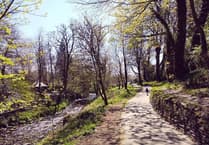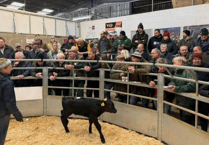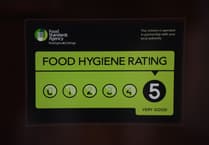RESIDENTS of Maer Lane were out in force last Thursday to oppose plans to change the use of fields at Bude Holiday Resort from touring caravans to static caravans and lodges, writes Ryan Cox.
An original application in early September met so much opposition from residents and town councillors that the planning consultants decided to withdraw it to take on board some of the objections and resubmit it.
But residents at Bude-Stratton Town Council planning meeting described the alterations as ‘modest’.
The main changes to the plan are a reduction in the proposed number of static caravans/lodges from 158 to 99 in the main site area, a reduction from the permitted 150 touring caravans in this location, and a reduction from 104 to 100 camping/touring pitches shown in the lower three fields to reflect the existing permissions for 100 units in this area.
As well as the change in use from touring to static caravans and lodges, the application proposes the closure of the main entrance to the site and improvements to the southern entrance, upgrading the infrastructure/services, the construction of a reception building and two shower/toilet block facilities, along with highway surface improvements.
More than 20 residents were at the meeting. Their spokesperson, Rob Colwill, said everyone in the ‘unique and historic hamlet’ was very much against the application. He described the revised proposal as only having ‘modest changes’.
Mr Colwill revisited the ‘wide range of concerns’ expressed in September, including the degree of intensification proposed and the impact it was likely to have on the area’s character and amenity of residents, the incompatibility of the proposals with relevant planning policy, the adverse impact on the historic character of Maer, the inadequacy of the technical work done to justify the proposals, for example the absence of properly constituted heritage and landscape analyses, and the ability of the applicant to implement the required improvements to Maer Lane.
In response to the revised proposals, Mr Colwill said although changes had been made they were modest, especially with regard to the three south western fields, which he felt are of greatest sensitivity.
He said: “The main changes [to the south-western fields] comprise the introduction of a Cornish hedge on the southern — Maer Lane — boundary, the removal of the show home and a reduction in the number of pitches to 100 — from 104 in the previous scheme.
“However, the fundamental components of the scheme for this part of the site are unaltered in that the scheme proposes a very substantial intensification in the use of this part of the site with 100 pitches proposed, together with the associated infrastructure, and the scheme retains the proposal to serve the entire and expanded Holiday Park via a new access onto Maer Lane at a position close to the south eastern corner of the site and therefore to Maer.
“The proposals will change and greatly increase the use of the Maer Lane access. This will undoubtedly increase the harm to the amenity of Maer Stables, as a result of noise, night time light pollution and disturbance, and particularly to residents of the new dwelling, and which will be sited immediately opposite the new entrance.”
Mr Colwill added: “As stated previously, we are not adverse to some expansion to the holiday park. However, the scheme still proposes a substantial increase in the intensity of holiday development in the area and as such has considerable potential for generating an unacceptable level of harm, particularly as a result of the scheme’s proposals for the south western fields and the associated introduction of a new main access off Maer Lane.
“Given the sensitivities, it is clear that any scheme must be much more modest in extent, with a lower density of new facilities and, in line with adopted policy, confined to being within the existing site boundaries or at least within the less sensitive northern part of the current application site.”
Planning consultant Walter Wonnacott, of Peter Wonnacott Planning in Bude, said the reason for withdrawing the previous application was to take on board what was said at the meeting in September and posted on the Cornwall Council planning website and to come back when some changes had been made.
One of the main areas of concern was the potential for increased flooding to Maer Lane residents; Mr Wonnacott explained the measures that were put in place to combat this, but residents were still worried it was not going to be enough.
Planning committee chair Bob Willingham said his objections had not changed much from last time.
Cllr Julia Bryson added: “I’d like us to use the same objection again but add more to it.”
Town mayor Cllr Lea Deely was also against the plans. She said: “If you increase the number of people using the site, there will be an increase in traffic on Maer Lane. If that’s the case I would do all I can to avoid going through Maer. The road is dangerous as it is. I would like to see our objection include access to the site from surrounding areas.”
After some deliberation on what should be added to the original application’s objection, the council objected to it on various grounds, including the site will be the equivalent to a new ‘township’ at the edge of Bude, overdevelopment, loss of privacy, historic impact, ecological impact, risk of flooding, burden on the existing sewage system, change of use from a 28-day agricultural use field to a 365-day static caravan use, and that access from surrounding areas such as Bude, Stratton and Poughill is totally inadequate.
Following the meeting, Mr Wonnacott provided the Post with the following statement: ‘The applicant is disappointed that despite the information provided in the meeting the majority of councillors voted to object to the application on grounds that have been fully addressed.
‘The main site area has sited over 50 caravans year-round (with permission for 150) for at least 15 years with the same holiday occupancy restrictions that are now proposed for static caravans; the reference to a ‘township’ is misguided and wholly inappropriate.
‘BSTC disregards the long-standing existing planning permissions for year-round camping and touring on this well-established campsite. BSTC has not identified how the development would involve any loss of privacy compared to existing permitted uses.
“BSTC offers no explanation for why expert advice is to be rejected: the Cornwall Council Historic Environment Officer and the Cornwall Wildlife Trust do not object to the application; Cornwall Council’s drainage officer did not object to the previous application, which was of greater scale, and SWW does not object to this scheme, which would reduce peak sewerage demand at the resort by 51 pitches.
‘No static caravans are proposed on any area of land subject only to ‘28-day agricultural use’.
‘The proposal would introduce significant road surface improvements, direct traffic away from the heart of Maer and reduce the peak flow from 250 towed caravans to 100 towed caravans, so there would be much reduced traffic pressure.
‘The resort is the only camping and holiday site in Bude within walking distance of the town and beaches. The proposal is designed to address the specific needs expressed by resort guests. This significant investment in Bude tourism would result in clear benefits to local businesses and to Maer residents alike.’
The final decision rests with Cornwall Council.



